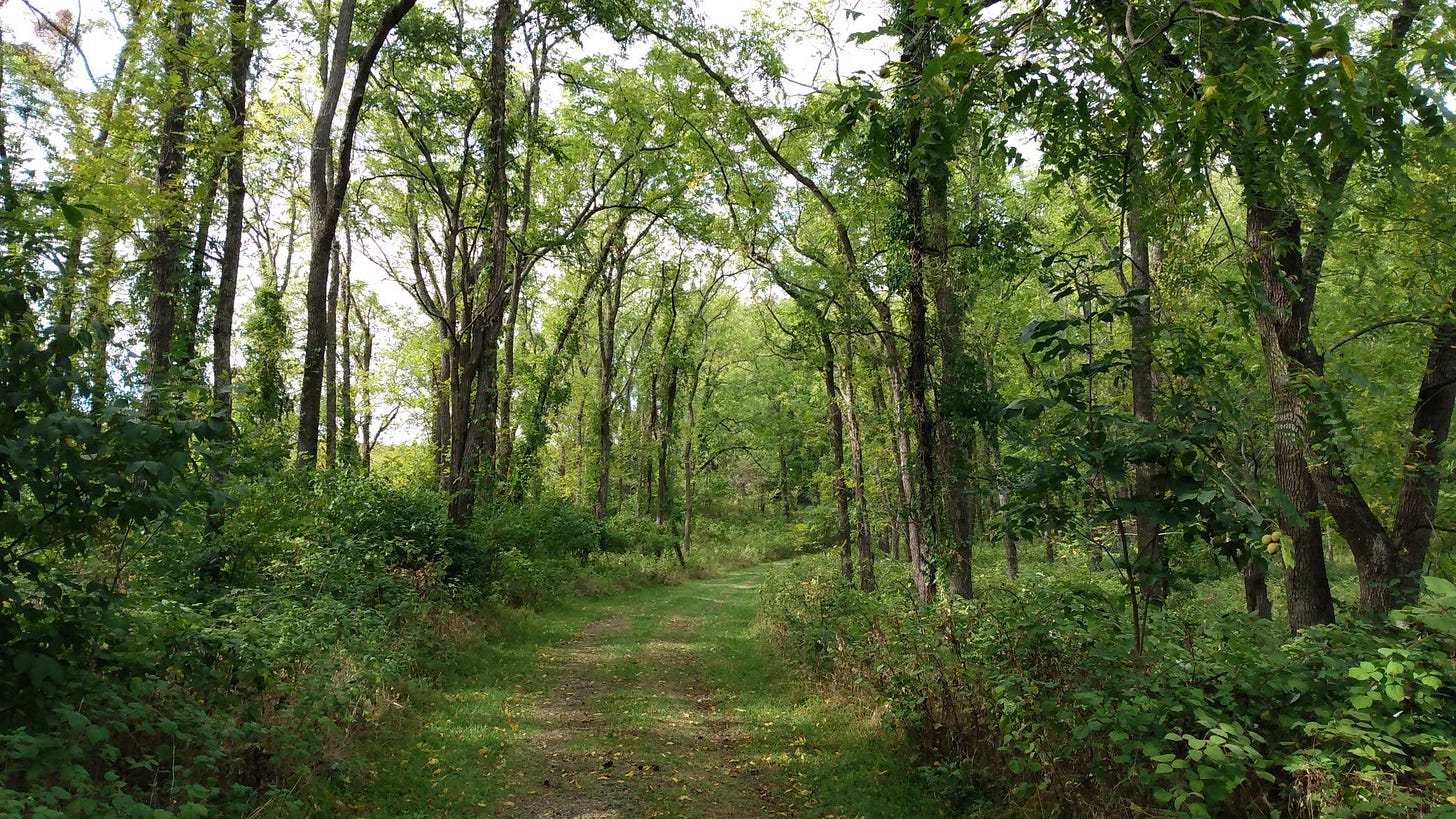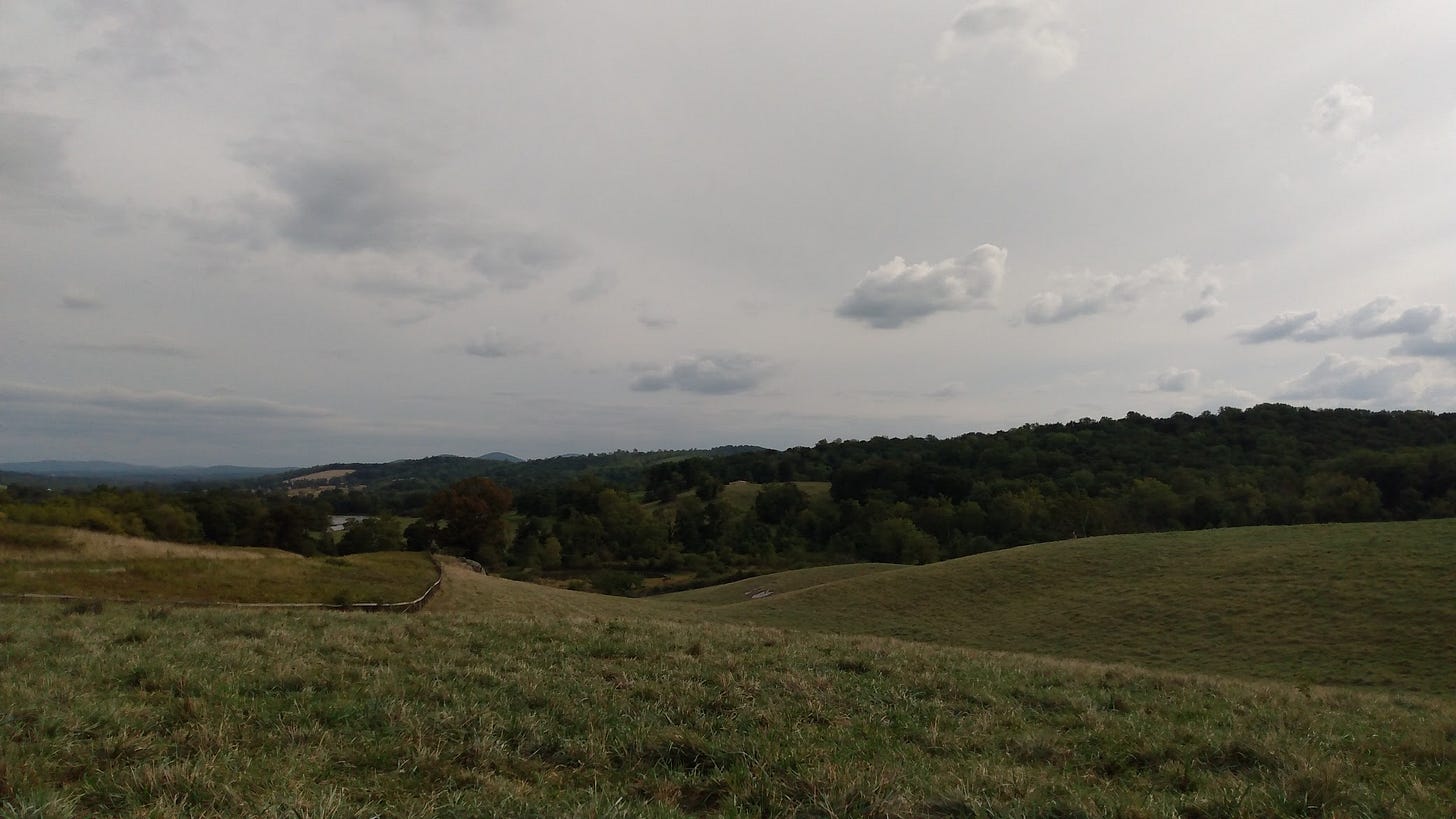Two roads diverged in a wood, and I—
I took the one less traveled by,
And that has made all the difference.1
Do I travel a lot? To some, yes. But to others, no. However, regardless of how I compare to fellow travelers, I think that yes, I do travel quite a lot. Or at least I cover a lot of ground each day. I may not hop on a plane every weekend but covering a few hundred miles via car each week doesn’t daunt me. It’s just another part of my routine.
That being said, as I wandered along paths in a state park recently, the thought struck me that the ratio of miles traversed while in a vehicle to miles covered on foot is already innumerable, and yet, with each day, the gap increases. A daily walk around my neighborhood may help a little, but even a quick trip to the local coffee shop or church increases my “walking debt.”
To travel across land on foot, as humans have done since the beginning of time, is to allow the land to mold and shape you. It wears us down. It both smooths out the rough edges and roughs up the smooth edges. During my walk, I glanced down at my ankles and noticed that the back of my legs were covered in dust from the field I’d walked through. Another evening I came home after a walk to find a bug had joined me inside by sneaking along on my clothes. Even a simple walk in my neighborhood at dusk leaves me sweaty and invigorated. This is as it should be. Traveling ought to allow the natural world to rough us up and break through the false walls of security we create.
Now, don’t get me wrong, traveling in a car can also mold and shape you. After a long day of traveling either by foot or car, we are left sore and exhausted. But here is the difference: when walking, it is the land itself that reaches out and shapes you, whereas when driving, it is your car that shapes you. When walking, the incline of the hill, the dust and pollen in the air, the bugs, the winds, the temperature, the humidity, and the precipitation all exert themselves upon you and roughen up the facade of perfection.
A car shapes you in a very different way. Though we feel the effects of a long drive, the environment is within our control. We choose the incline of our seat, the temperature, the force of the fans blowing air on us. We spray the windshield when it gets too grimy and roll up the windows to block out the rain. We choose the sounds that reach our ears. We select the scent we wish to bask in. We enter and exit the vehicle without breaking a sweat or sacrificing our meticulously styled hair. We may be sore or cramped, but whereas walking makes us sore from all that we have done, driving makes us sore from all we have not done. Our stagnation exhausts us.
Yet, integrated as we are into modern society, very few of us are able to eschew the car entirely. Even escapes into nature usually demand that we first rely upon a vehicle for transportation to the natural world. I doubt any of us will ever achieve an even ratio of miles walked to driven (not to mention miles flown). But should we simply despair and give up hope? Is our only choice to romanticize past centuries and wistfully dream of generations who trod where we now drive?
Yes, it is unquestionable that the ratio will remain uneven. But we must strive to increase the miles walked, little by little. Step out your front door. Walk a few steps to the end of your driveway. Notice each blade of grass, blowing leaf, buzzing bee. Pause and glance up, straight up. Revel in the sky. Adjust your shoes and walk firmly down a road you’ve never traversed. Walk to truly know the world. Walk to listen. Walk to see with new eyes. Walk to pray in the garden with Christ. Walk in this valley of tears, pondering the steps of Adam. Walk to open your eyes and your heart. Walk to clear your mind. Walk to fight for truth and beauty. Step by step by indefatigable step.
The world is charged with the grandeur of God.
It will flame out, like shining from shook foil;
It gathers to a greatness, like the ooze of oil
Crushed. Why do men then now not reck his rod?
Generations have trod, have trod, have trod;
And all is seared with trade; bleared, smeared with toil;
And wears man's smudge and shares man's smell: the soil
Is bare now, nor can foot feel, being shod.
And for all this, nature is never spent;
There lives the dearest freshness deep down things;
And though the last lights off the black West went
Oh, morning, at the brown brink eastward, springs —
Because the Holy Ghost over the bent
World broods with warm breast and with ah! bright wings.2
Robert Frost, “The Road Not Taken”
Gerard Manley Hopkins, “God’s Grandeur”







“…but whereas walking makes us sore from all that we have done, driving makes us sore from all we have not done. Our stagnation exhausts us.”
I like this a lot. Great article. A lot to ponder.